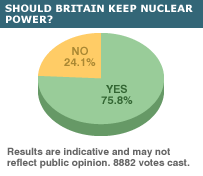I just started reading James Lovelock's new book, The Revenge of Gaia, and I've already tripped over some interesting passages in his chapter on energy sources. It was in that chapter that I read about a BBC program that aired in 2004 entitled, If ... The Lights Go Out. Here's a description:
 In the wake of the program, the BBC asked viewers if Britain should keep its nuclear plants (see left).
In the wake of the program, the BBC asked viewers if Britain should keep its nuclear plants (see left).
More details, here. There are all sorts of drawbacks to overreliance on Russian natural gas.
Technorati tags: Nuclear Energy, Environment, Energy, Politics, Technology, Electricity, Nuclear Power, James Lovelock, Climate Change, Global Warming, GHG, Russia
In the first episode, set in the winter of 2010, Britain is struggling to generate enough electricity to cope with demand. Most of our gas reserves in the North Sea have been used up and the country is already heavily dependent on imported gas to generate electricity, most of which we buy from Russia. At that time gas fuels almost 60% of UK electricity generation, and renewables (mostly wind) 10%. Coal and nuclear have fallen to about 16% each. A terrorist attack on a gas pipeline in Russia cuts off much of the UK’s gas supply. This incident coincides with prolonged cold and calm weather, causing massive power cuts in the East and South of England with devastating effects.
[...]
Such a scenario is neither implausible nor sensationalist, but could occur as a direct result of our current energy policy. In an electricity market that provides little incentive to generators to invest in new capacity, with coal and nuclear stations coming to the ends of their useful lives, and increased reliance on intermittent wind and gas imports for the bulk of our generating capacity, Britain’s security of electricity supply will be in serious jeopardy. According to research by Professor John Gittus, Britain could move from being the most to the least energy self-sufficient country among the developed nations within 20 years.
 In the wake of the program, the BBC asked viewers if Britain should keep its nuclear plants (see left).
In the wake of the program, the BBC asked viewers if Britain should keep its nuclear plants (see left).More details, here. There are all sorts of drawbacks to overreliance on Russian natural gas.
Technorati tags: Nuclear Energy, Environment, Energy, Politics, Technology, Electricity, Nuclear Power, James Lovelock, Climate Change, Global Warming, GHG, Russia
Comments